02/10/2020
Invito alla prima del progetto Social Art per l’Inclusione
domenica 4 ottobre 2020 alle 18.00
Spazio Eventi – Officina Giovani – Prato
La parabola scenica di Bertold Brecht ci ha permesso di affrontare l’interessante tema degli opposti che vivono dentro di noi.
Ehi uomo, due anime vivono nel tuo seno
non hai scelta, entrambe sono in te
nel conflitto è la tua essenza
tieni l’alto, tieni il basso
tieni il buio, che è già luce
le due parti, sono una.
(da „Santa Giovanna dei Macelli“, Bertold Brecht 1932)
Siamo mai completamente buoni o cattivi?
O piuttosto in noi abitano caratteristiche e sentimenti contrapposti che di volta in volta si manifestano?
La severità del cugino Shui Ta talvolta è necessaria per rimettere al centro i propri bisogni, definire dei confini opportuni e non lasciarsi travolgere dagli eventi o dalle troppe richieste esterne.
Siamo partiti il 7 settembre, e in sole 4 settimane ci siamo addentrati in un testo non facile, „L’anima buona di Sezuan“ del 1942, manipolandolo come creta per dargli forme comode per il gruppo di lavoro.
Abbiamo improvvisato, ci siamo posti domande, proprio come lo stesso Brecht fa nella sua opera e, dai tanti momenti di condivisione, è nato il testo che ci ha accompagnato in scena, mantenendo nel titolo quel punto interrogativo che non fornisce risposte.
Il pubblico è invitato a riflettere: la bontà che porta alla rovina è una provocazione, che non vuole scoraggiare ma stimolare.
Presto, pensate a come ciò sia attuabile! Una fine migliore ci vuole! È indispensabile!
La Social Art stessa è una provocazione, che cerca di trovare un ponte tra l’arte e la vita, portando nella vita le regole dell’arte e, nell’arte, i cambiamenti continui che avvengono nella vita.
E in questo 2020 di cambiamenti ce ne sono stati molti, che hanno portato nuove regole, nuove modalità di lavorare, nuove vie per stare in relazione, nuovi limiti e nuove possibilità per la costruzione di uno spettacolo teatrale.
Abbiamo accettato la sfida, abbiamo cercato, insieme, risorse e soluzioni, abbiamo continuato a credere nell’importanze dell’arte come strumento fondamentale di crescita personale, autoconoscenza, consapevolezza e benessere.
TRAMA BREVE
La prostituta Shen Te, unica anima buona disposta ad ospitare tre dèi giunti in Sichuan per verificare la bontà delle persone, riceve da loro una forte somma di denaro, con cui cambia vita, compra una tabaccheria ed inizia a fare tutto il bene possibile agli altri, così come è congeniale alla sua indole altruista.
In breve, però, questa sua disponibilità la rende bersaglio di molti personaggi parassiti e, per non soccombere, la buona Shen Te si traveste da uomo, il cugino Shui Ta, scaltro e severo, che inizia a sistemare le cose cacciando via gli intrusi e mettendo ordine negli affari economici.
Quando però Shen Te si innamora perdutamente di Yang Sun, aviatore disoccupato, interessato più che altro al suo denaro, tutto si complica e per evitare la rovina Shen Te fa tornare Shui Ta.
È possibile essere buoni con gli altri e contemporaneamente salvaguardare se stessi? Gli dèi osservano gli umani, senza interferire, senza dare risposte, lasciando che ciascuno trovi la sua strada.
PERSONAGGI ed INTERPRETI
I tre dèi: Dario Gusella, Henry Chidozie Iwuoha, Alessia Seminara
Il capo degli dèi: Sara Bonichi
Wang, l’acquaiolo: Tommaso Biscione
Shen Te: Denisa Toma
La vedova Shin: Erica Passerini
Marito: Antonio Nicoletti
Moglie: Debora Ferretti
Il disoccupato: Henry Chidozie Iwuoha
Lin To, falegname: Linda Trevisan
Mi Tzü, padrona di casa: Sara Bonichi
Shui Ta: Cristoforo Villanacci
Il poliziotto: Linda Trevisan
Yang Sun: aviatore Leonardo Cangioli
La signora Yang: Alessia Seminara
Mercante: Antonio Nicoletti
Moglie del mercante: Debora Ferretti
Shu Fu, il ricco barbiere: Dario Gusella
(Alessia De Rosa, regista e, insieme a Fedora Ginanni, drama teacher del progetto).
Invitation to the opening night of the Social Art for Inclusion Project
Sunday October 4th 2020 at 6.00 pm
Spazio Eventi – Officina Giovani – Prato
Bertold Brecht’s scenic parable allowed us to tackle the interesting theme of the opposites that live inside us.
Humanity! Two souls abide
within thy breast!
Do not put either one aside
for life with both is best.
Be two in one! Be here and there!
Keep the lofty and the low one
Keep the righteous and the raw one
Keep the Pair
(from „Saint Joan of the Stockyards“, 1932)
Are we ever completely good or bad?
Or rather, do we inhabit opposing characteristics and feelings that from time to time manifest themselves in us?
Cousin Shui Ta’s severity is sometimes necessary to put one’s needs back into focus, define appropriate boundaries and not let oneself be overwhelmed by events or too many external demands.
We started on September 7th, and in just 4 weeks we entered a text. „The Good Woman of Sezuan“, that was not easy, manipulating it like clay to give it comfortable forms for the working group. We improvised, we asked ourselves questions, just as Brecht himself does in his work and, from the many moments of sharing, the text that accompanied us on stage was born, keeping in the title that question mark that does not provide answers.
The audience is invited to reflect: the goodness that leads to ruin is a provocation, which does not want to discourage but to stimulate.
Fast, think about how this is feasible! A better end is needed! It is indispensable!
Social Art itself is a provocation, trying to find a bridge between art and life, bringing into life the rules of art and, in art, the continuous changes that happen in life.
And in this 2020 of changes there have been many, bringing new rules, new ways of working, new ways of relating, new limits and new possibilities for the construction of a theatrical performance.
We have accepted the challenge, we have sought, together, resources and solutions, we have continued to believe in the importance of art as a fundamental tool for personal growth, self-knowledge, awareness and well-being.
PLOT
The prostitute Shen Te, the only good soul willing to host three gods who came to Sichuan to verify the goodness of people, receives from them a large sum of money, with which she changes her life, buys a tobacconist’s shop and starts to do as much good as possible to others, as is congenial to her selfless nature.
In short, however, this availability of hers makes her the target of many parasitic characters and, in order not to succumb, the good Shen Te disguises herself as a man, her cousin Shui Ta, cunning and severe, who starts to settle things by chasing away intruders and putting order in economic affairs.
But when Shen Te falls madly in love with Yang Sun, an unemployed aviator who is more interested in her money than anything else, everything gets complicated and to avoid ruin Shen Te makes Shui Ta come back.
Is it possible to be good to others and at the same time safeguard oneself?
The gods observe humans, without interfering, without giving answers, letting everyone find their own way.
CHARACTERS and INTERPRETERS
The three gods: Dario Gusella, Henry Chidozie Iwuoha, Alessia Seminara
The head of the gods: Sara Bonichi
Wang, the water peddler: Tommaso Biscione
Shen Te: Denisa Toma
The widow Shin: Erica Passerini
Husband: Antonio Nicoletti
Wife: Debora Ferretti
The unemployed: Henry Chidozie Iwuoha
Lin To, carpenter: Linda Trevisan
Mi Tzü, hostess: Sara Bonichi
Shui Ta: Cristoforo Villanacci
The policeman: Linda Trevisan
Yang Sun, aviator: Leonardo Cangioli
Mrs. Yang: Alessia Seminara
Merchant: Antonio Nicoletti
Merchant’s wife: Debora Ferretti
Shu Fu, the rich barber: Dario Gusella
(by Alessia De Rosa, director and, together with Fedora Ginanni, drama teacher).
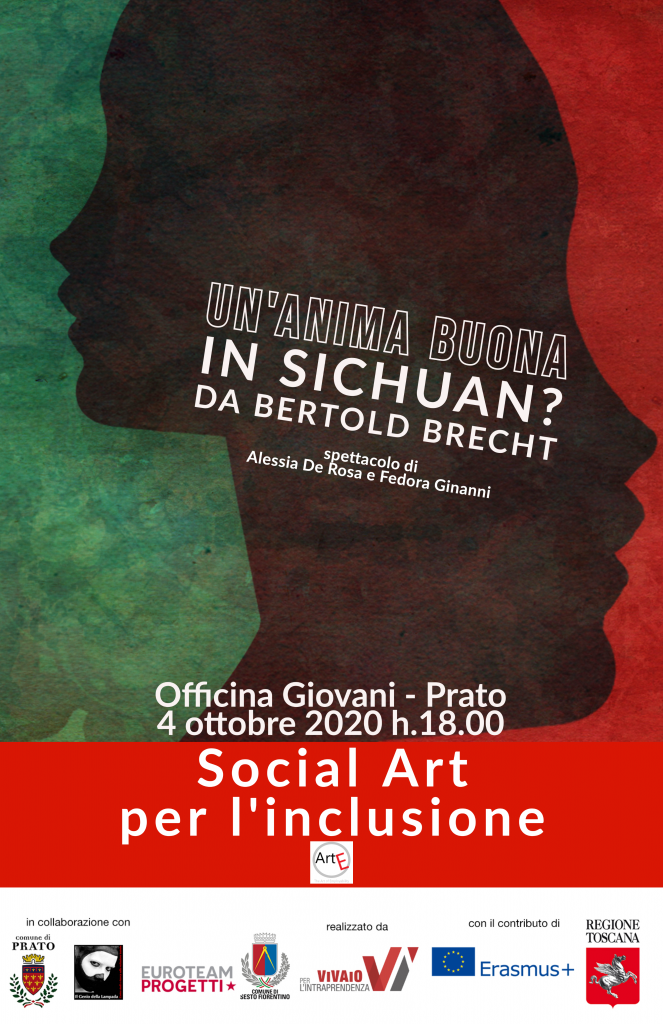
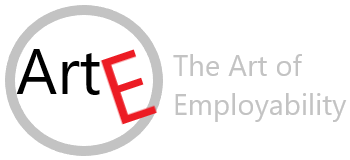
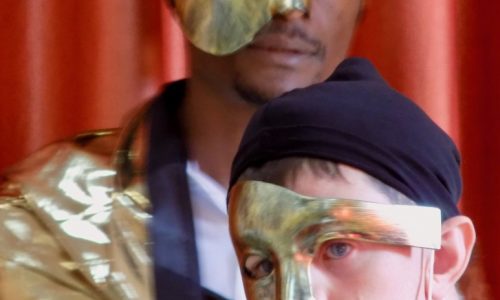
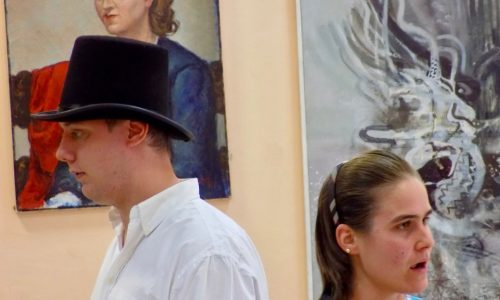
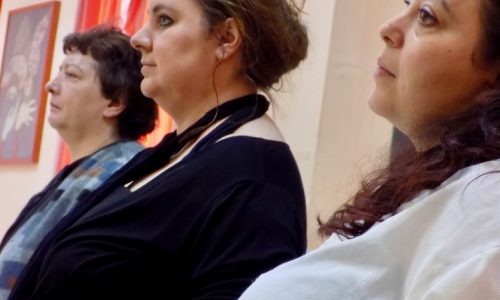
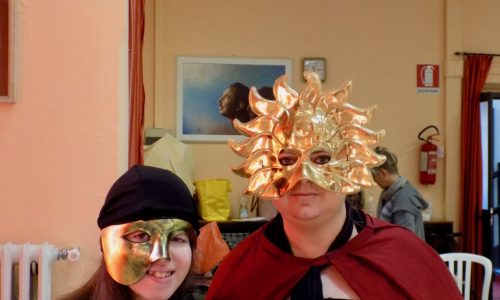
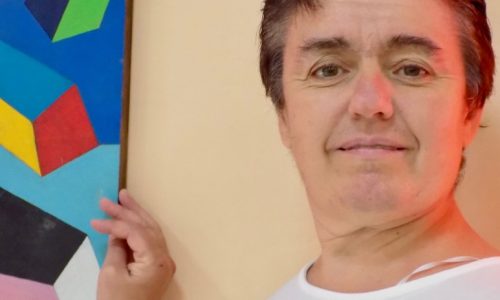
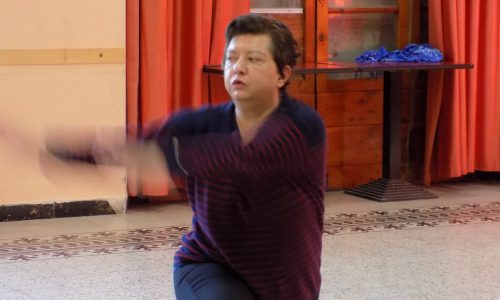
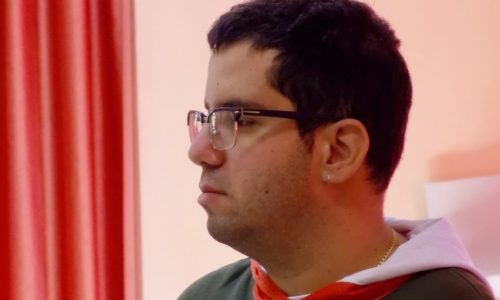
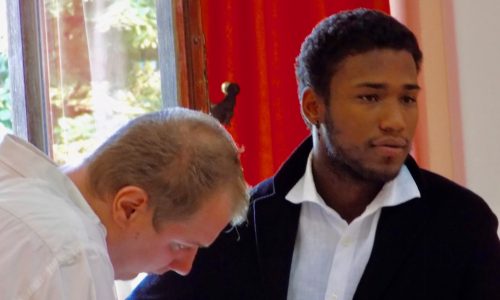
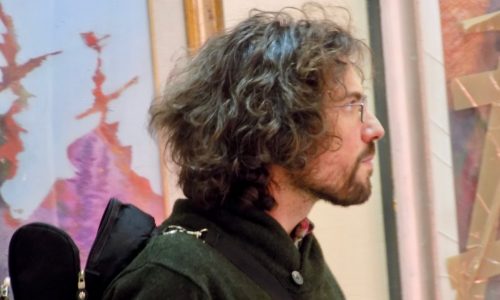
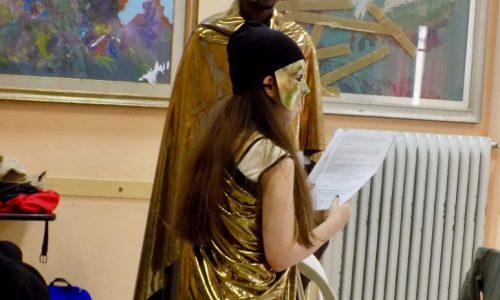
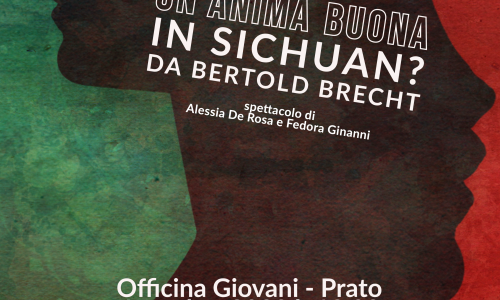
No Comments